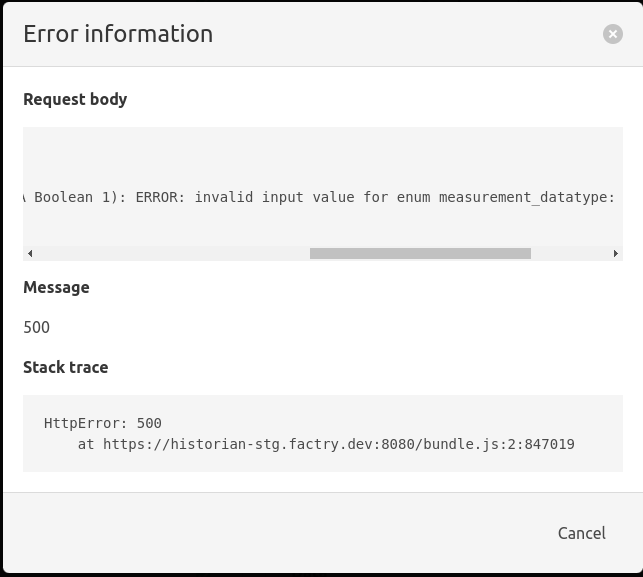Import measurements in bulk
Adding measurements one by one, would be a time-consuming operation.
Therefore we support importing measurements in bulk, either via a spreadsheet or either via a JSON format. Use the stack icon on top of the measurements page to start the import.

A template for importing measurements in bulk can be retrieved from the collectors page. Since this template depends on the collector type, first select the matching collector and then download the template .
Spreadsheet
For a spreadsheet, the file extensions .xlsx and .ods are accepted. The table below provides a generic example of the different measurement settings. Next to some optional fields, most of the fields are required. Furthermore, the specific measurement settings are depending on the collector type selected.
| Name | Description | Datatype | Database | Collector | Tags | Status | Specific measurement settings |
|---|---|---|---|---|---|---|---|
| Optional | Optional | .. |
To give a clear overview of the measurements, it’s recommended to have separate tabs/spreadsheets for every collector type.
JSON
Example
|
|
Import status
On a successful import, a green success notification should appear holding the message. If the import failed, an error notification will show up. Click the question mark to retrieve more details about the error.


Export measurements
Next to importing measurements in bulk, all measurements can be exported at once into a spreadsheet format. Use the spreadsheet icon on top of the measurements page to start the export.

Pause or delete measurements in bulk
Via the bulk import, one has the ability to set the status of multiple measurements at once.
To conveniently update the status of multiple measurements in one go, start from a
clean export
!
Pause measurements in bulk
To pause measurements in bulk, set the status column of these measurements to Paused. If these measurements are still existing in the Factry Historian, their status will be updated and the data collection for these measurements will be paused until it is resumed again. To resume the data collection for these measurements, set the status back to Active.
Delete measurements in bulk
To delete measurements in bulk, set the status column of these measurements to Deleted. If these measurements are existing in the Factry Historian, they will be soft deleted (receive a status Deleted but are still retreivable by Factry Support in case of necessity). Once a measurement is deleted, the measurement stops collecting data and will disappear for good from the historian webpage.
Renaming measurements
Renaming of measurements in a timeseries data model is a resource costly operation. After all, the name of a measurement exists as a hard reference to the measurement’s data upon the creation of the measurement. Therefore renaming a measurement includes making a new measurement with a new name and migrating all the data of the old measurement to the new measurement.
For that reason, renaming of measurements is not available as an operation in the Factry Historian, yet if necessary it can be done manually for a few measurements by the Factry Support. Alternatively, one can create a new measurement and delete the old measurement together with it’s data.